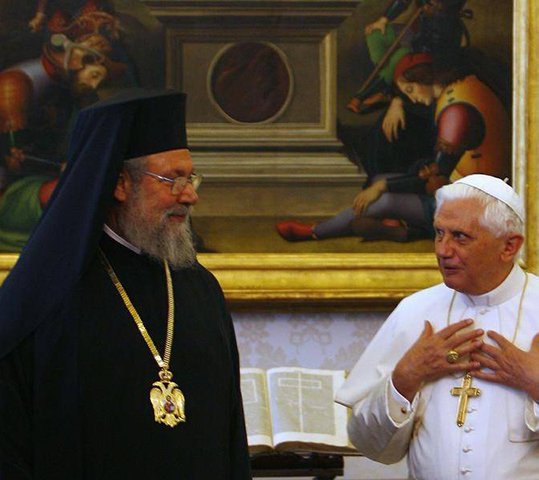The outspoken head of the Greek Orthodox Christian Church in Cyprus, Archbishop Chrysostomos II, passed away on Monday. His forays into the murky world of the nation’s politics and finances enraged both supporters and opponents. He was 81.
Chrysostomos, who had endured liver cancer for the previous four years, passed away in the nation’s capital while spending his final hours there.
A bulletin issued by a team of doctors said the archbishop “passed peacefully after facing the trial of his ailment with courage, patience, and Christian endurance” at 6:40 a.m. Monday.
“All those who were close to him during the difficult hours of his ailment experienced his humility, kindness, and deep faith as well as his concern for his flock,” the bulletin said. It added that the archbishop left behind a legacy marked by his “vision, daring, respect for and restoration of the church’s historic tradition as well as innovative changes that always aimed for the unity of the church.”
“What we will always follow us is his directness, kindness, politeness, and his smile,” the bulletin said.
The Holy Synod, the church’s top decision-making body, will meet to plan the burial, to which other Orthodox Church officials will be invited, according to the CyBC.
Orthodox clergy
Chrysostomos was a tall, imposing man with a white beard, as is customary for Orthodox clergy. He rarely held back when it came to expressing his opinions on matters ranging from politics to the nation’s finances, which enraged some politicians and other detractors who chastised him for not abiding by his religious obligations.
Chrysostomos stated he would have preferred that the cash-strapped country forsake the euro as its currency rather than accept a bailout package, which he claimed would put its economy back decades, before the island nation’s multibillion-euro financial rescue by foreign creditors in March 2013. A euro withdrawal, according to him, would at least save Cyprus’ honor.
Large depositors in the two largest banks in the country were forced to lose some of their savings once the agreement was reached.
An indignant Chrysostomos said: “This isn’t the Europe that we believed in when we joined.”
Archbishop Chrysostomos’ Early Career.
Chrysostomos, who was born on April 10, 1941, found his calling in religion at a young age when, after completing primary school, he enlisted as a lay brother in Cyprus’ renowned Saint Neophytos monastery. He steadily advanced in the church until 1978, when he was appointed bishop of Paphos, the prefecture where he was born.

Despite his political views, the archbishop collaborated closely with other Christian leaders and the Muslim mufti, the spiritual head of the Turkish Cypriots, to reconstruct sacred spaces in order to convey the idea that religion is an anchor for peace rather than a barrier.
The church has had a significant presence in Cyprus since the Middle Ages when the Ottoman rulers of the island acknowledged it as the only representative institution of the Greek Orthodox Christian populace. This persisted all the way up until 1960 when Cyprus became free of British colonial rule after electing Makarios as the nation’s first president.
Archbishop
Chrysostomos strengthened the church’s finances as archbishop and implemented a number of reforms, including regaining the church’s autonomy in making decisions by strengthening the Holy Synod through the installation of additional bishops and the creation of a new constitution.
Also Read: Former FCT Council President, Danladi Zhin, dies at 54
Archbishop Chrysostomos II was a staunch advocate for improved ties between the Orthodox and Catholic churches and established a church office at the European Union’s headquarters in Brussels.
“I want to do real work, not just for show. I came and I’ll eventually be gone, so I want to leave something behind for this country, that’s what matters,” Chrysostomos told state broadcaster CyBC in 2022.


